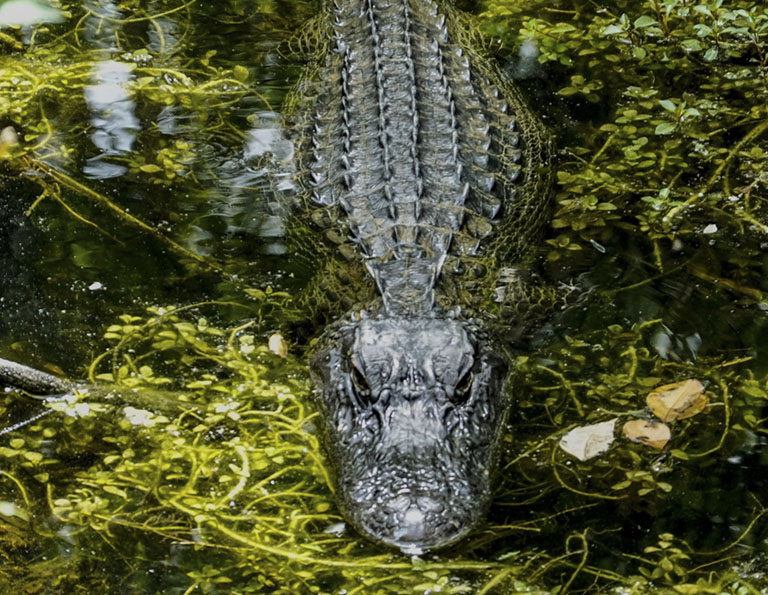
Community
Fun Facts About Alligators
July 06 2022
No one that I know of thinks that alligators are cute although I’m sure there are many alligator fans out there. They’re certainly not an animal you want to cuddle with or sleep with. You have to give them credit, however, for being an animal that has survived for as long as the alligator has. One source said they have been on earth for 200 million years. Another source said 84 million years and yet another one said 37 million years. We’ll never know for sure but whatever their age, they’re old! They lived at the same time as dinosaurs and their appearance has changed very little since then. The alligators we see and hear about in our area are American alligators and are significantly larger than their counterparts, the Chinese alligators that live in Asia.
Alligators are carnivores. Young alligators begin eating as soon as they hatch. They eat snails, insects, worms and fish. Adults will eat anything they can take down including deer and even bears. They can leap 5 feet into the air to catch birds. Sad to say but they will also eat small family pets if given the opportunity.
Depending on who you ask, alligators are either at the top of the food chain or near the top. Loss of habitat and being killed for their skin are the biggest threats.
FAST FACTS ABOUT ALLIGATORS:
- Texas Parks and Wildlife Department estimates that about 400,000 to 500,000 alligators live within the state.
- Alligators live in fresh water.
- They can run for short spurts at speeds exceeding 30 miles per hour. They have also been known to climb fences and ladders.
- Alligators are the largest reptile in North America. Adult females can reach nearly 8.5 feet long while males can grow to 11.5 feet. They can live to be 50 years old.
- Alligators normally only attack humans that are in what an alligator considers “his” territory or if they feel threatened. They will also attack to protect their young.
- In Texas, the mating season is March through May; clutch size is 20 to 50 eggs; gestation takes 60-65 days. During mating season, males fight each other for females and territory. The sex of the young is determined at birth depending on the outside temperature. Lower temperatures produce females with higher temperatures producing males.
- Mom alligators protect their young for up to two years. During the first few months of life, baby alligators often fall prey to raccoons, bobcats, and sometimes other alligators.
- Alligators have up to 80 teeth and if teeth are lost, they will grow back. It is estimated that an alligator will lose up to 2,000 teeth during their lifetime.
- Alligators use their muscular tails to propel them through the water and for defense.
- People often mistake crocodiles for alligators and vice versa. Crocodiles are larger and have a more pointed snout and are only found on the southern tip of Florida.
- The alligator nostrils are upright which allows them to breathe while swimming underwater. Often times the nostrils are all that can be seen when they’re in the water.
- The skin on the back serves as armor. The spikes are called scutes and make the skin very hard to penetrate.
- Under these Texas statutes, no person may take, sell, purchase, or possess an alligator, an alligator egg, or any part of an alligator without a permit.
If you see an alligator, here are some safety tips:
- Don’t kill, harass, feed or try to move it. It is against the law. Contact Texas Parks and Wildlife for other authorities for assistance in moving a nuisance alligator.
- If the alligator hisses, you’re too close. Slowly move away.
- If you live near lakes or streams, keep your pets and children away from the water’s edge.
- Don’t swim in lakes and streams at night when alligators are most active.
- Most importantly, use common sense. These are wild animals!



